 Prakash Karat
Prakash Karat
As leaders of disparate opposition parties appeared on one stage in Bengaluru Wednesday amid talks that opposition unity will be key to defeating the BJP in 2019, the CPI(M) sounded a word of caution and said that it would be “erroneous” to underestimate the party’s strength and “facile” to think that electoral tactics alone would be enough to defeat the BJP.
In an editorial in party mouthpiece People’s Democracy, former CPI(M) general secretary Prakash Karat argued that it would be erroneous to underestimate the pan-India strength of the BJP even after the results in recent elections to Gujarat, Karnataka Assemblies.
“With the post-election alliance of the Congress and the JD(S) successfully thwarting the BJP in Karnataka, there is renewed talk that a united opposition can take on the BJP in 2019 Lok Sabha election. It is necessary, therefore, to take stock of the situation and have a clear-eyed view of the way the fight against the BJP-RSS forces can be carried forward,” the editorial stated.
It said there is no doubt that the BJP has emerged as the dominant political party at the national level over the last four years, as it has registered electoral successes in most Assembly elections held since 2014. The results of Gujarat and Karnataka, it said, have shown its weakness and vulnerabilities.
“In the case of the Gujarat assembly election, it (BJP) could win just 99 seats compared to 115 seats it had previously held. In Karnataka, though it emerged as the largest single party, its poll percentage was 36.2 per cent as compared to 38 per cent of the Congress,” Karat wrote. “However, it would be erroneous to underestimate the pan-India strength of the BJP and would be facile to think that electoral tactics alone would be enough to defeat the BJP.”
According to the editorial, the key link at this juncture is to “gather the growing discontent against the BJP rule, especially due to the worsening conditions and threats to people’s livelihood”.
In Karat’s view, the situation is ripe for intensifying struggles of people — workers, farmers, agricultural workers, Dalits, adivasis, women, youth and students.